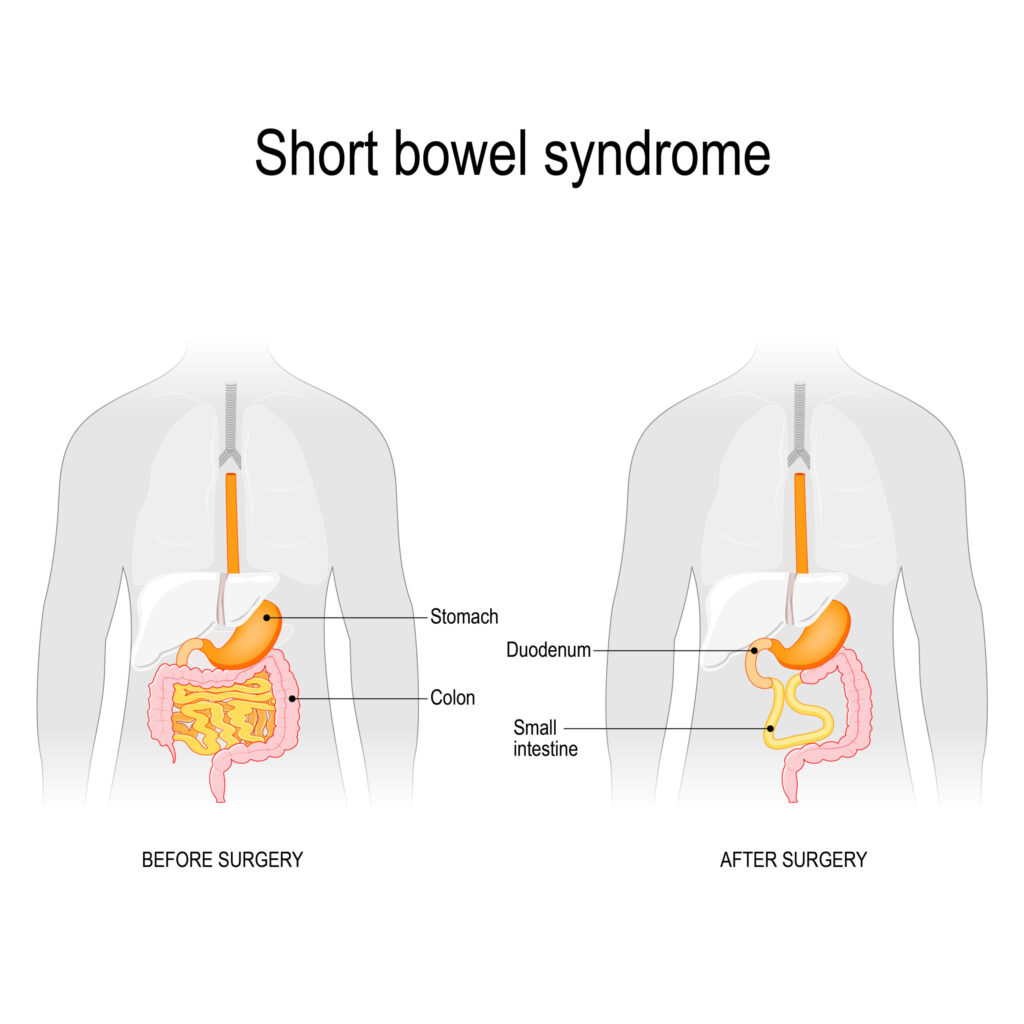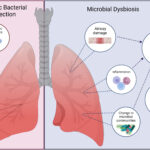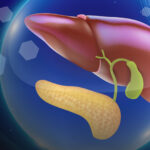Chronic diarrhea is a prevalent and often debilitating condition in individuals with short bowel syndrome (SBS). This condition significantly impairs the quality of life for those affected, as it can lead to dehydration, malnutrition, and frequent hospital visits. In this article, we provide a comprehensive overview of chronic diarrhea associated with short bowel syndrome, addressing its causes, symptoms, and the latest treatment options available for management.

What is Short Bowel Syndrome (SBS)?
Short bowel syndrome is a disorder that occurs when a significant portion of the small intestine is removed, often due to surgical interventions like resection of the bowel for various diseases (e.g., Crohn’s disease, mesenteric ischemia, cancer). The small intestine plays a critical role in nutrient absorption, and when it is shortened, the body may struggle to absorb essential nutrients, leading to malabsorption and severe diarrhea.
Short bowel syndrome is classified based on the extent of bowel resection. Individuals with more than 50% of their small intestine removed are at a higher risk for developing complications, including chronic diarrhea.
Causes of Chronic Diarrhea in SBS
Chronic diarrhea in patients with short bowel syndrome is primarily caused by the reduced capacity of the remaining intestine to absorb nutrients, fluids, and electrolytes. Several factors contribute to this issue, including:
- Malabsorption of Nutrients: The shortened length of the small intestine leads to a decreased surface area for nutrient absorption, resulting in undigested food reaching the colon, which causes diarrhea.
- Bile Acid Malabsorption: The small intestine plays a vital role in absorbing bile acids, which are necessary for the digestion and absorption of fats. In SBS, the remaining intestine may not have the capacity to absorb enough bile acids, leading to diarrhea.
- Increased Intestinal Motility: Patients with SBS often experience accelerated motility of the intestines, which means food and waste move through the digestive system too quickly for proper absorption, leading to diarrhea.
- Small Intestinal Bacterial Overgrowth (SIBO): A lack of sufficient intestinal length and changes in the normal gut flora can cause an overgrowth of bacteria in the small intestine, exacerbating malabsorption and diarrhea.
- Reduced Pancreatic Enzyme Secretion: The pancreas produces digestive enzymes that aid in the breakdown of fats, proteins, and carbohydrates. In SBS, pancreatic insufficiency can contribute to poor digestion, resulting in diarrhea.
Symptoms of Chronic Diarrhea in SBS
Chronic diarrhea associated with short bowel syndrome presents in a variety of forms, but common symptoms include:
- Frequent watery stools: Often occurring multiple times per day.
- Abdominal cramps and bloating: Caused by undigested food moving through the digestive system.
- Dehydration: Excessive loss of fluids due to diarrhea can lead to severe dehydration.
- Weight loss: Due to malabsorption and poor nutrient intake.
- Fatigue: A result of the body’s inability to absorb essential vitamins and minerals.
If these symptoms are not managed properly, they can lead to serious complications, including electrolyte imbalances and vitamin deficiencies.
Diagnosis of Chronic Diarrhea in SBS
The diagnosis of chronic diarrhea in patients with SBS involves several clinical assessments and tests. Common diagnostic procedures include:
- Medical History and Physical Examination: A thorough history of the patient’s bowel resection and symptoms will guide the diagnosis.
- Stool Tests: To rule out infections or malabsorption issues, stool tests are conducted.
- Blood Tests: To assess electrolyte imbalances, dehydration, and vitamin deficiencies.
- Imaging Tests: Such as X-rays or CT scans to evaluate the condition of the small intestine and any possible complications.
- Bile Acid Secretion Tests: To assess bile acid malabsorption, a common contributor to diarrhea in SBS.
Management and Treatment of Chronic Diarrhea in SBS
The management of chronic diarrhea associated with short bowel syndrome requires a multifaceted approach that aims to control symptoms, prevent complications, and improve the quality of life for patients. Key treatment strategies include:
1. Dietary Modifications
Dietary management is crucial for controlling chronic diarrhea in SBS. A low-residue, low-fat diet may be recommended to reduce the load on the remaining intestine. High-fiber foods should be limited, as they can exacerbate diarrhea. Specialized diets that include liquid or semi-solid foods may help improve nutrient absorption. Patients are often advised to eat smaller, more frequent meals to ease digestion.
2. Medications
Several medications can help manage chronic diarrhea in SBS, including:
- Anti-diarrheal agents: Medications like loperamide can reduce bowel motility and help control diarrhea.
- Bile acid sequestrants: These medications, such as cholestyramine, bind to bile acids, preventing them from irritating the intestines and causing diarrhea.
- Octreotide: A somatostatin analog that can reduce intestinal motility and control diarrhea in some cases.
- Antibiotics: To treat small intestinal bacterial overgrowth (SIBO), which can exacerbate diarrhea.
- Pancreatic enzyme replacement therapy: For patients with pancreatic insufficiency, enzyme supplementation can help with digestion and improve nutrient absorption.
3. Parenteral Nutrition (PN)
For patients with severe malabsorption and chronic diarrhea, parenteral nutrition (PN) may be necessary. This involves delivering nutrients intravenously to bypass the digestive system entirely. PN is typically used as a temporary solution, although long-term use may be required in some cases.
4. Surgical Interventions
In certain cases, surgical procedures may be required to improve the function of the remaining intestine. One option is intestinal lengthening surgery, which aims to increase the length of the remaining intestine, improving nutrient absorption. Another option is intestinal transplantation, typically reserved for patients with end-stage SBS who do not respond to other treatments.
5. Probiotics and Prebiotics
The use of probiotics and prebiotics can help maintain a healthy balance of gut bacteria, especially for those suffering from SIBO. These supplements may improve gut motility and reduce symptoms of diarrhea.
Prevention and Outlook
Preventing chronic diarrhea in patients with SBS primarily focuses on the early detection and management of nutrient malabsorption, motility issues, and bacterial overgrowth. Regular follow-up with healthcare providers and timely intervention can significantly improve outcomes for patients with this condition.
With proper management, including dietary changes, medications, and surgical interventions if needed, individuals with short bowel syndrome can experience relief from chronic diarrhea and lead a healthier, more comfortable life.
MYHEALTHMAG

